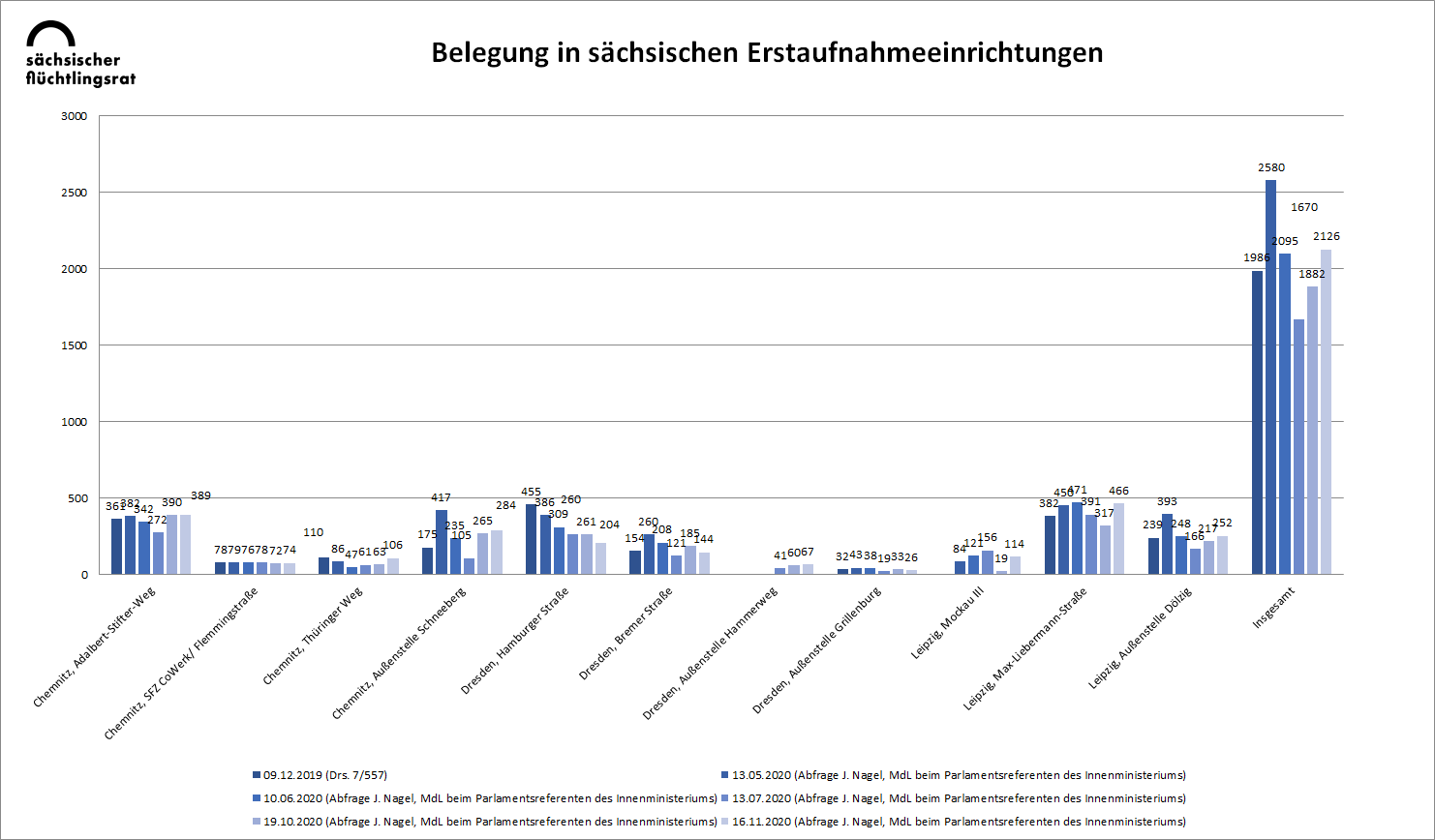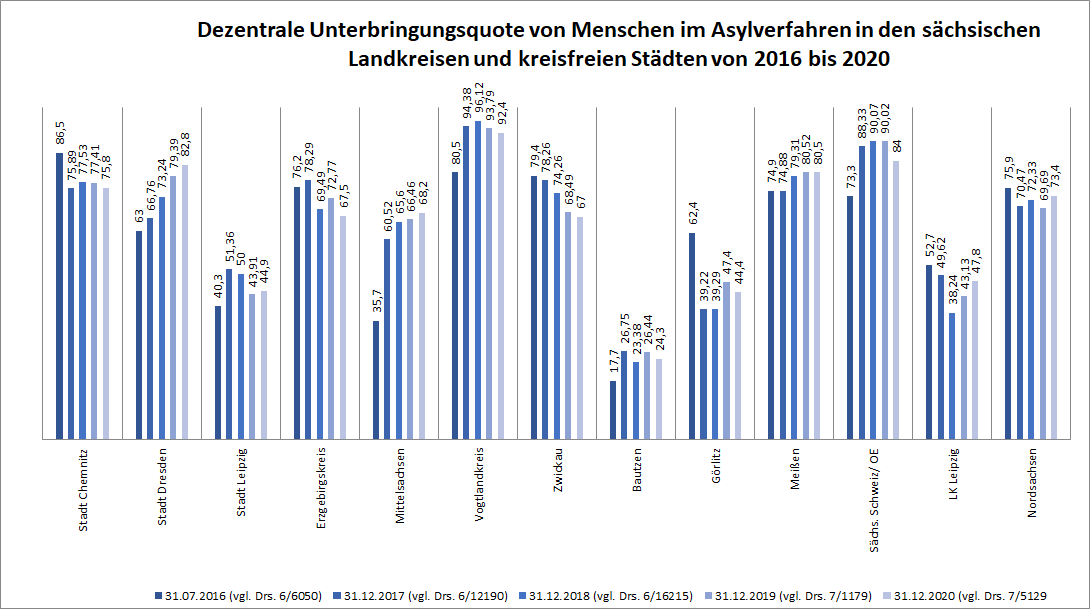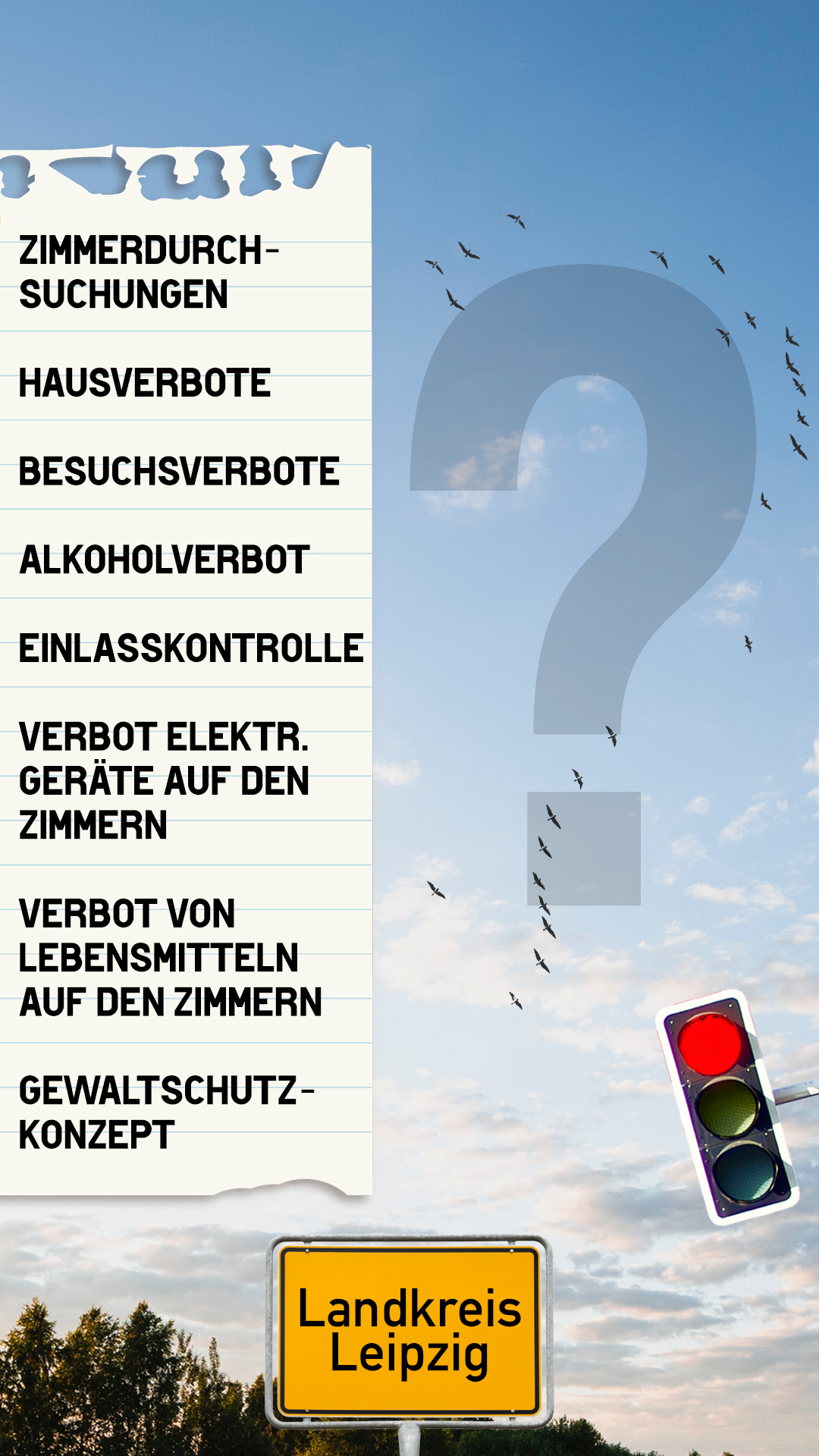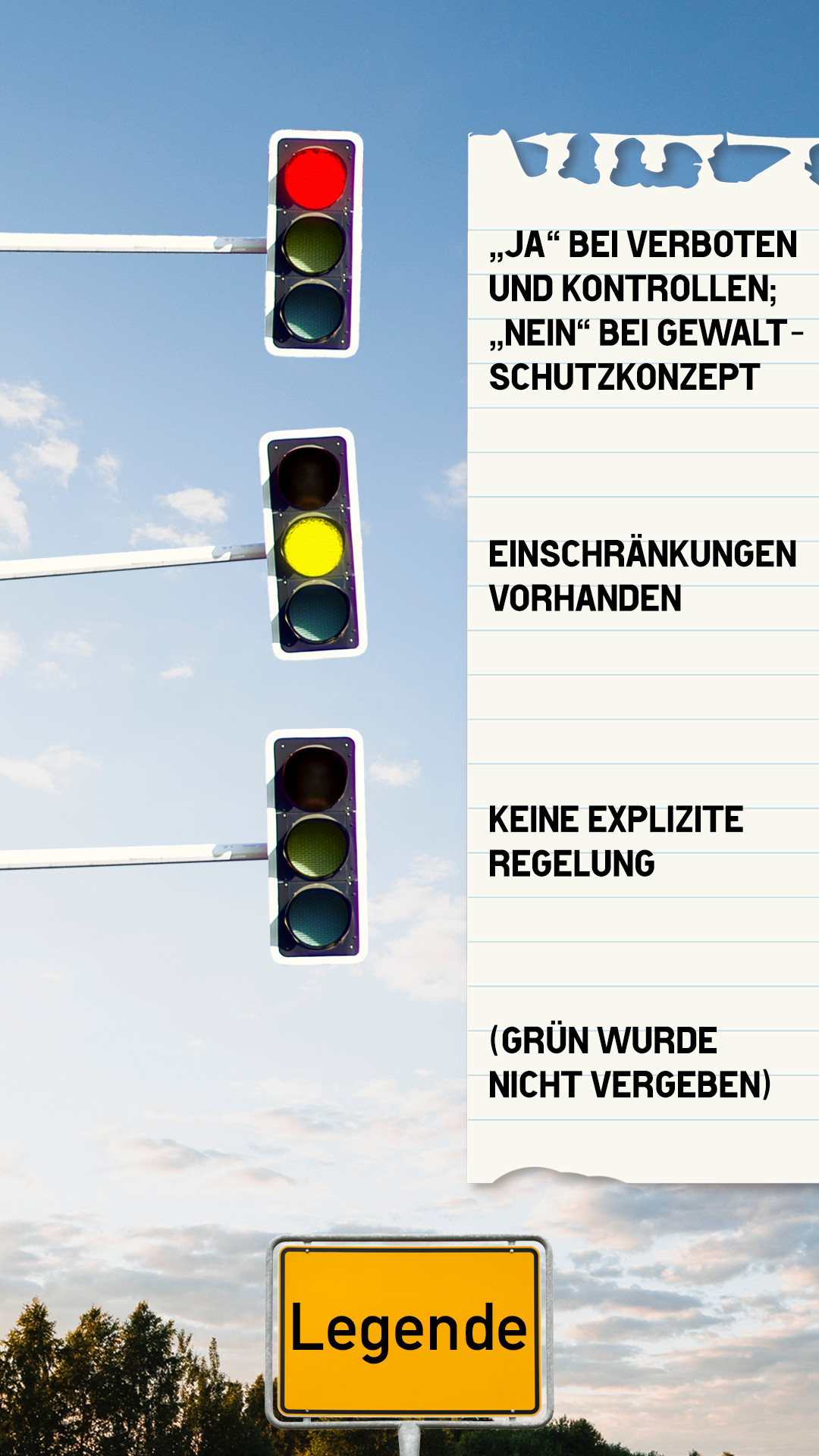In a successful cooperation of DIE LINKE / The Leftist party in Saxony, we can present: an analysis of house rules in refugee camps! Why? Because it is the house rules in the camps that make life difficult for the people. The analysis is in the shape of traffic lights, so you can compare it easily.
It is clear: not once the color green appears. This means that room searches are constantly taking place. This is a violation of Article 13 of the German Basic Law. It guarantees the protection of the home. People are thrown out of the camp because they are said to have violated the house rules. Not even the everyday consumption of food is always possible. There is a lack of concepts to protect against violence, and when they do exist, they are often enough to make one’s hair stand on end. They do not meet the minimum standards of the Federal Ministry for Family Affairs, Senior Citizens, Women and Youth and UNICEF.
Translated with www.DeepL.com/Translator (free version)
With this page we now give all activists in Saxony, refugees, advisors, volunteers, city and district councillors and journalists a basis to find out what the status of basic rights looks like in your area. And: we show how to act against restrictive house rules and thus against camps per se.
On this info page we provide…
- The traffic light analysis
- All house regulations of the state, the cities and the counties
- All what you need to become active legally and politically against the camps
- Our #CampTours
- A short background: what are camps?
- What we stand for: camp policy turns to actual housing policy!
I. Traffic light analysis
It turns out that Saxony’s house rules are particularly restrictive. Everything is red, except for the yellow violence protection concept, which, again, does not deserve the name. With regard to the municipalities, there are strong variations. Some have house rules for all shared accommodations, others have different ones specifically for each one.
II. All house regulations of the state, the cities and the counties…
…links for your own research and as a basis for becoming active:
- Bautzen – has specific house rules for its camps Hoyerswerda, Kamenz, Wehrsdorf
- Chemnitz – has specific house rules for its camps Altendorfer Straße, Annaberger Straße, Chemnitztalstraße, Oberfrohnaer Straße, Straßburger Straße
- Dresden – has standards for the house rules
- Erzgebirge – provides its standard house rules and its security concept
- Görlitz – has specific house rules for the camps Friedersdorf (with security concept), Löbau, Niesky, Sachsenstraße Zittau, Portsmouther Weg Zittau
- Leipzig (City) – has one house rule for all camps. für alle Gemeinschaftsunterkünfte, which, despite the poor result in the traffic light analysis, stands out positively due to its direct and actually polite address (the word “please” appears now and then, for example) to the residents.
- Leipzig (County) – The Head of County Administration refuses to hand over the house rules. He reasons it with data protection, which he has allegedly has to grant to the camp operators. That this is humbug is shown, among other things, by the legal review published for Saxony (see below), which clarifies that the operators are only the extended arm of the camp authorities. Thus, the Leipzig County Administration is also obliged to account for the issue of basic rights in its camp. Our local party faction has asked again!
- Meißen – has specific house rules for the camps Riesa Birkenwäldchen, Riesa Nickritzer Straße, Großenhain, Radebeul (with security concept)
- Mittelsachsen – has one house rule for all camps
- Nordsachsen – has not provided its house rules yet. Different from Leipzig county this happened by accident. Our party faction has asked again. The house rules of Oschatz camp are available though.
- Sächsische Schweiz/ Osterzgebirge – has specific house rules for its camps Schmiedeberg and Klingenberg as well as a security concept
- Vogtland – has one house rule for the camp in Plauen
- Zwickau – has not provided its house rules yet. Different from Leipzig county this happened by accident. Our party faction has asked again.
- Saxony – has one standard house rule for its camps as well as a concept for the protection from violence
III. Lager Watch – Become active yourself!
First of all: in Saxony, some preliminary work has already been done so that house rules can be attacked. The Sächsischer Flüchtlingsrat e.V., the Antidiskriminierungsbüro e.V. and the Leipziger Initiativkreis: Menschen.Würdig. have published a legal review. In it, the lawyer Martin Wiesmann states:
“Such restricitions of fundamental rights are only tenable in prisons. There, they take place on the basis of a law passed by parliament. House rules cannot justify intensive restrictions. The possibilities for sanctions are not constitutionally tenable at all. The way the house rules are designed, they regularly violate Article 13 of the German Basic Law – the protection of the home.”
Martin Wiesmann in Legal Review on “House Rules in Camps” published May 26th 2021 on a press conference by Antidiskriminierungsbüro Sachsen, Sächsischem Flüchtlingsrat and Leipzig Initativkreis: Menschen.Würdig.
So far, so clear the need for action. How can the legal opinion now be applied in practice? Basically, it is quite simple, because even a room search is the violation of fundamental rights. All that is needed for this is the following:
- a description/ reconstruction as precise as possible of the event in which fundamental rights were interfered with –> signed with the following contents:
- Where exactly (room, gate, yard, etc.)?
- Who (social workers, security, …) and how many?
- When?
- What happened?
- How long did the incident last?
- What reasoning was given for the human rights violation?
- The whole thing should fit on half to one full A4 page, that’s all it takes.
- Power of attorney for a lawyer –> we are in contact with a lawyer who is informed about these proceedings and willing to conduct them before the respective administrative court in Saxony. Write to us for this at camptours@linxx.net.
Get started!
Lager Watch is a campaign all over Gerany [https://lager-watch.org/] that aims to end all camps. The house rules have been crystallized as a good target for this. Therefore: become active yourself, don’t wait for us! The human rights violations concern us all. What can YOU do? The following is written in the call of the campaign:
“How to start?
- Find out where the nearest camp is located. This can be a reception center of the country, but possibly also a large shared accommodation in the responsibility of your city or your district.
- Get in contact with the residents! Talk to them, give them a voice, publish videos, interviews, support residents in organizing and making demands!
- Document encroachments of basic rights like searching rooms, violent securities, sanctions like a house ban and more. Talk to the affected people about whether they agree to a publication.
- Organize the house rules of the respective camp! This has been done in some federal states, for example, through contacts in the camps – house rules must be posted. Or win over members of parliament or city/county councils and ask them to send a request to the city or state government asking for the publication of the house rules. Possibly the refugee council of your federal state has already been able to research house rules.
- Initiate your own legal opinion on the respective house rules!
- Bring the criticism to the press! Put refugees in touch with journalists so that they can report directly on what is going on behind the camp fence.
- Draw attention to the conditions in the camp with actions, rallies, flash mobs, social media campaigns.
- AND LAST but not least, join our nationwide networking to get an overview of what’s going on elsewhere, what strategies are being used in other communities or states. “
IV. linXXnet #CampTours
We have started #CampTours! Mohsen and Mark from linXXnet first drive to the reception facilities of the Free State of Saxony and talk to the people, go into their rights and how they can enforce them. Because: in a repressive system, this is deliberately not done by authorities and operators, even responsibilities are concealed. Many residents in Dölzig, for example, are not aware that they have to contact the state administration – not Malteser – if they want to submit an application. And: the house rules are to be attacked. For this, we encourage people to file lawsuits against violations of fundamental rights – legitimized by the house rules. Soon we will also deal with the common accommodations of the municipalities :)) All videos are available here: https://www.youtube.com/watch?v=R2Bz-5NMbEI
V. Background: What exactly are the camps?
Currently, the State of Saxony maintains ten camps labelled reception facilities. Current occupancy figures are compiled by the Saxon Refugee Council on the basis of Jules Kleinen Anfragen in the state parliament:

Regularly, people can be obliged to stay in the camp for up to 18 months for the duration of their asylum procedure – and even longer if they are rejected. In the case of people from countries that are labelled to have “poor prospects of staying,” this can even be up to 24 months.
If the desired “transfer” to one of the 13 counties or cities takes place, a rude awakening may follow. Because people do not have a choice where they are transferred to. And: it may be that the person is transferred to a shared accommodation. This may or may not be bad. Some shared accommodations consist of lockable apartments with their own kitchen and bathroom. Others, however, like the reception facilities, cannot be described as anything other than camps.
VI. Then camp policy turns to housing policy!
Basically, we demand that refugees can also live in their own apartment, from the first day of their arrival. An own apartment offers the necessary privacy and is an essential basis for a self-determined life. Social support is already offered in many districts and municipalities, also decentralized or/and contact points in the social space. In Saxony, the city of Leipzig alone understands “decentralized accommodation” to mean living in one’s own apartment with one’s own rental contract.
The development of the decentralized accommodation rate – with Vogtland as the long-time front-runner and Bautzen as the perpetual taillight – here:















